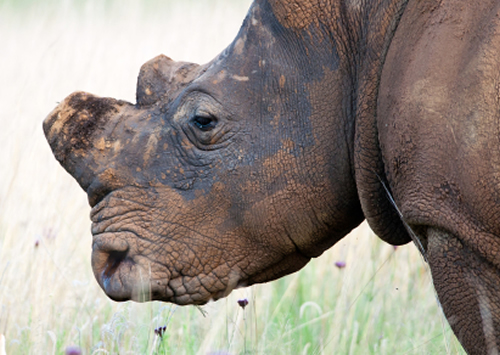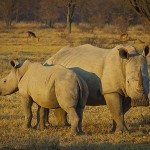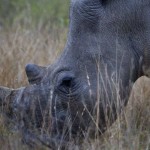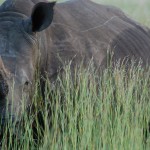
Should the international community take a closer look at South Africa’s role in rhino horn trafficking?
In 2003, an unexpected criminal element was taking root in South Africa. Certain safari operators were found to be using legal trophy hunts as a front for running rhino horn to Vietnam. Six years later, the wildlife trade monitoring network TRAFFIC noted in its report ahead of CITES CoP15 that the bogus hunts were taking place on “the same game ranches repeatedly”. It seemed that some of South Africa’s game ranchers were making the most of their access to aircraft, guns, veterinary drugs, and connections to the professional hunting fraternity.
The first of South Africa’s rhino horn trafficking rings to make international headlines was referred to as the “Boere Rhino Mafia” in a 2010 Mercury investigative piece (Tracking down the ‘Boere rhino mafia’). This crew’s unsavory operation began to unravel in 2006 with the arrests of brothers Nicolaas and Gideon “Deon” van Deventer. In an interview with photojournalist Ian Michler, the van Deventer brothers admitted to killing calves as well as adult rhinos. They received jail sentences after confessing to shooting 19 white rhinos. They used a variety of weapons borrowed from fellow hunters and illegally loaned from gun shops.
“Eighteen died within close proximity to where they were shot and one escaped wounded. Of the total, 16 were adults and three were calves, killed because they kept milling around their dead mothers. Eight of the rhinos were shot in the southern reaches of the Kruger National Park, two in Hluhluwe–iMfolozi and the rest on private game farms owned by people known to the syndicate members.”
Information received from the van Deventers led to the arrests of George Clayton Fletcher, co-owner of Sandhurst Safaris, and Gerhardus “Gert” Bartlomeus Saaiman, owner of Saaiman Hunting Safaris, Saaiman Game Ranch and Saaiman Aviation. A third brother, Frans Andries “Andre” van Deventer, was also nabbed.
Multiple charges were brought against the “Boere Rhino Mafia”, including racketeering, money laundering, various counts of theft, malicious damage to property and contraventions of the various provincial Conservation Acts and the Aviation Act.
- According to South Africa’s National Prosecuting Authority, “hunters, a pilot, middlemen (agents) and buyers illegally hunted rhinos … The Aerostar was used to locate the rhinos in various National Parks around the country. It was also used to transport poachers to different national parks where the rhinos were spotted.”
- In May 2010, over R40 million in properties belonging to Fletcher and Saaiman were seized by the Asset Forfeiture Unit.
- In October 2010, Gideon van Deventer reportedly told prosecutors he was no longer willing to testify. He said that two private investigators have been visiting him in prison, offering him money not to testify – and threatening to harm his children if he does.
- The case was “struck from the roll” by Judge Nomonde Mngqibisa of the North Gauteng High Court. The court ruled that to delay the case any further would be unfair to the accused. The judge pointed out that the State’s case was based on the testimony of a convicted criminal.
“She said while she understands he is making it hard for the state to prepare for trial, the three accused – George Fletcher, Gerhardus Saaiman, Frans van Deventer – as well as their families, are living under the stigma of the charges which were levelled four years ago.
The judge said they are losing their social standing because of delays caused by a man in prison.”
The defense team apparently included attorney Terry Price, who was also responsible for getting socialite Paris Hilton’s marijuana charges dropped during her World Cup visit.
By 2011, Saaiman and the third van Deventer brother, “Andre”, were starting a hunting business in the Republic of Congo, according to the huntingreport.com website. Saaiman reportedly encountered a problem with his firearms paperwork. He blamed “a conflict with a wildlife conservation organization in a neighboring area”.
“He says this NGO is unhappy to see a hunting operation set up shop in Congo and has been problematic, possibly exerting its influence with the local police.”
But a year later, all seemed well with former rhino horn trafficking suspects Saaiman and van Deventer, who had since changed the name of Saaiman Hunting Safaris to Congo Safaris.
Rhino poachers are Cunts of Day. The 11 charged in S.Africa make you wonder how sickeningly evil & greedy people can be. http://bit.ly/M6tBk
— Cunt of the Day (@cuntoftheday) September 23, 2010
Three weeks before the Boere Rhino Mafia case was thrown out, eleven individuals were arrested in South Africa for killing rhinos and selling their horns on the black market. Allegedly led by game rancher Dawie Groenewald, proprietor of Out of Africa Adventurous Safaris, the group included wildlife veterinarians Karel Toet and Manie du Plessis. The eleven suspects were dubbed the “Groenewald gang”.
Four years later, Groenewald and his alleged co-conspirators still face 1,872 charges, including illegal rhino hunting, racketeering, permit violations, illegal trade in rhino horn, money laundering, and violating the Biodiversity Act and the Act on the Prevention of Organised Crime.
- In October 2010, investigators discovered a mass grave of 20 dehorned rhinos on Groenewald’s “Pragtig” property in Musina. The rhino carcasses were buried after “a local butchery refused to buy any more”.
- Despite the pending court case, Groenewald continued to buy and sell rhinos in South Africa. Between January 1, 2008, and March 11, 2011, he was issued permits to “hunt, convey, import, and export white rhino” by provincial government authorities.
- Assets totaling approximately R55 million (US $6.8 million) belonging to rhino horn syndicate suspects Dawie Groenewald, Karel Toet and Manie du Plessis were seized in a May 2012 raid (the link to the press statement has since been removed).
Seizing assets from inside Groenewald’s house of horrors:
On July 21, 2014, the Groenewald gang made yet another court appearance. Unsurprisingly, the case was postponed until August 2015.
Meanwhile, a year-long investigation revealed yet another South African rhino horn trafficking network whose nefarious schemes are chronicled in Julian Rademeyer’s book, Killing for Profit: Exposing the Illegal Rhino Horn Trade.
The case took shape in 2011, when safari operator Marnus Steyl, and Chumlong Lemtongthai, a Thai national, were arrested for using loopholes in South Africa’s hunting laws to camouflage their illegal rhino horn dealing operation. Lemtongthai was in South Africa to do the bidding of the Vixay Keosavang, allegedly head of Laos-based Xaysavang Network.
In a letter dated October 30 2010, Steyl confirmed that “Steyl Game CC helps to organise and conduct hunting for clients of Xaysavang Trading Export-Import co Ltd of Laos” and “assists with the export of predators, wild game, antelope and exotic species like rhino, lion, sable and roan antelope”. On November 16, Xaysavang was invoiced a total R1.3m by Steyl Game for 22kg of rhino horn. A month later, an amount of R434 000 was invoiced for “3 rhino”.
Thai nationals Punpitak Chunchom and Tool Striton, as well as South African professional hunter Harry Claassens, were also arrested for their involvement with the scheme.
- As part of the Steyl-Lemtongthai trophy hunting scam, young women from Thailand were allegedly trafficked into South Africa to pose as “rhino hunters” and to work in “brothels and strip clubs”.
- South Africa requested an INTERPOL Red Notice for Punpitak Peter Chunchom in 2013. He had previously been arrested in 2008 for attempting to purchase rhino horns from an undercover police officer
- In November 2013, the United States offered a $1 million reward for information leading to the dismantling of the Xaysavang Network, headed by Vixay Keosavang.
Graphic video evidence depicts a “pseudo-hunt” directed by South African Marnus Steyl.
Lemtongthai — who signed an affidavit saying that Steyl was not involved — is now serving a 20-year jail sentence (reduced from 40 years). South Africa requested an INTERPOL Red Notice for another Thai national, Punpitak Chumchom, who fled the country shortly after his arrest.
But the Boere Rhino Mafia, the Groenewald gang, and the Steyl-Lemtongthai operation were not South Africa’s only problems:
After the South African government finally took steps to tighten its trophy hunt regulations and basically stopped issuing permits to “hunters” from Southeast Asia, new mules were recruited. And in July 2013, 24 rhino horns were seized and 16 suspects were arrested in the Czech Republic.
These “hunters” were said to have been hired by an “international criminal gang” to participate in bogus trophy hunts in South Africa. Customs officials at Prague’s Václav Havel International Airport became suspicious and contacted the police, according to Radio Prague. Both Czech and “foreign nationals” were arrested. The Environmental Investigation Agency noted in a February 2014 report (In Cold Blood) that “efforts by the Czech authorities to exchange information with South African counterparts, including using INTERPOL channels, were largely fruitless”.
It must be also be noted that in July 2013, an investigative report by Fiona MacLeod and Estacio Valoi revealed that South African trophy hunters are operating a rhino horn trafficking ring out of Mozambique. The kingpin is said to be a “safari outfitter with a hunting concession close to Corumana dam” who pays bribes to the local police chief to have charges against his operatives dropped.
There is growing concern that South Africa’s judicial focus is on “poachers” and couriers, rather than the organizers and facilitators higher up in the criminal network.
With the exception of Thai national Chumlong Lemtongthai, who is currently serving a 20-year jail sentence, most of the jail sentences have been handed down to replaceable cogs, rather than key players:
- Mandla Chauke, a South African arrested in 2011, was convicted in July 2014 of “murder, illegal hunting of rhinos, rhino horn theft, illegal possession of firearms and ammunition, as well as trespassing in a national park” and sentenced to 77 years in prison.
- Mozambican national Inaso Makhubela and South African Jorudo Ngobeni each received 15-year jail terms in April 2013 for killing a rhino in October 2011.
- Game farmers Ewart Potgieter and Riaan Vermaak were sentenced in August 2012 to 18 and ten years respectively, for their scheme to kill rhinos at Mkuze Falls Private Game Reserve, but will actually serve 11 years and seven-and-a-half years.
- Game farmer Jacques Els was sentenced in July 2012 to eight years in prison following his October 2010 arrest for illegal possession of 30 rhino horns.
- Vietnamese national Duc Manh Chu received a 12-year prison term for illegal possession of 12 rhino horns. Another Vietnamese national, Phi Hung Nguyeng, was sentenced to eight years in prison for illegal possession of six rhino horns. Both were arrested at O.R. Tambo Airport in June 2010.
TRAFFIC’s rhino horn and ivory trade expert, Dr. Tom Milliken, noted this discrepancy back in February 2012 when three Mozambicans received 25-year prison sentences, saying, “We have now moved into serious deterrence territory, at last. ”
“But the proof in the pudding will be if those South African game-industry white guys who are involved in rhino crime get similar sentences. Then we’ll start to see things turned around.”
But things did not turn around. In April 2013, Africa Check reported a dismal conviction rate for rhino crimes.
“Between January 2010 and July 2012, 573 people were arrested for rhino related crimes. Yet, in 2012, only 28 accused were convicted in 20 cases.”
South Africa’s rhino situation has spiraled out of control, with at least 558 rhinos reportedly killed in 2014 as of this writing. Other rhino range states are in trouble, too, with 24 rhinos gunned down this year in Kenya, and 22 in India.
Cronyism, racketeering, money laundering, violation of national and international wildlife conservation laws, and a multitude of sinister enterprises built on rhino horn trafficking have flourished under South Africa’s convoluted and seemingly unregulated private game ranching industry. There seems to be a glaring lack of accountability — and as the primary source country for illegal rhino horn, shouldn’t South Africa receive the same level of international scrutiny as Vietnam and Mozambique?




